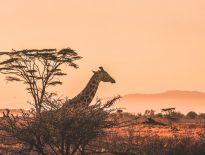During childhood, making friends is easy. Someone in your class would ask for your name or you ask for theirs and ask ‘can we be friends?’ Sometimes no one even asks, friendship is just agreed upon by mutual assumption. Having a friend was such a thing of joy. You get to have a buddy to play with during breaks, someone to share your food with, someone to gist with and share inside jokes. Having a best friend brought even greater joy. Others you may share but the best friend was your wingman (or woman).
Over the years, the process of making friends became more complex and the criteria for being friends expanded. Not everyone you talk to in your social circle is your friend. You know this and they know it too. You drift apart from some of your old friends. I mean, “Twenty friends cannot play together for twenty years” right? You learn that there are different kinds of relationships: acquaintances, casual friends, social friends, close friends, intimate friends and of course romantic relationships.
Read – How Friendship Saved me from Seclusion – A Creative Non-Fiction by Francis Mkwapatira, Malawi
Even among those that are deemed close friends, you learn that you should have different levels of intimacy. You also learn that there are different kinds of love: Agape love, Phileo, Eros and Storge, and that each has a different degree and is for a different class of people.
There are different theories about the kind of people that can be friends. Some tie it to zodiac signs: Gemini makes the best friends with Capricorn, Virgo and Aquarius; Aries makes the best friends with Scorpio, Libra and Taurus. Other theories say friendship has to be complementary, extroverts to introverts, raging lions to meek lambs. While others base it on mutual interests. Regardless of which theory, healthy friendship has to be mutual. Most times we don’t know what will bring us together with a new friend till we are already friends.
Friends are not arbitrary humans who come into your life to make it better (or worse), they are humans, just like you with a life to live, with dreams, aspirations and fears, whose paths have amicably crossed yours.
Read – My Life Gem – A Creative Non-Fiction by Ebere Nnabuike, Nigeria
We learn that friendship is the foundation of intimacy; it is the bedrock of marriage. But what is the bedrock of friendship? Showing interest in other people, listening attentively or being friendly? To me, loving yourself is the foundation of friendship. I would call it self-ship.
The statement, ‘hurting people hurt people’ is a reflection of the fact that in all ‘-ships’ people are simply a reflection of who they are, nothing more, nothing less. Friendship can have an influence on a person but that person still reflects the new person they have become.
The kind of person you are determines the kind of employee you would be, the kind of boss you will be, the kind of friend you will be and ultimately the kind of friends you will have. Self-ship is thus very important.
Jesus’ second commandment states, “Love your neighbour as yourself” and though He says that you should love the Lord your God, the Bible ultimately asks, “How can you say you love God whom you cannot see if you do not love your brother whom you can see?”
Read – Lost to Life – A Creative Non-Fiction by Autricia Njang Timti, Cameroon
Every friendship grows in stages: from strangers to acquaintances and then to friends. When you meet someone for the first time, you don’t know anything about them. Attraction or chance brings you together and you start communicating. You get to know a few things and the person seems ‘alright’, you hang out more or talk more virtually depending on the kind of person you are. You learn a couple more things. Some you like, some you think you can manage but the general feeling is positive and the friendship progresses. You forgive them when they wrong you and go out of your way to make them happy. For as long as you remain friends, you keep learning new things about them.
The same applies to ourselves. We were once strangers discovering ourselves, the things we like, the things we don’t, the way we learn and the way we forget. We learnt to love (or not love) ourselves. With every new phase, we discover new things about ourselves. The way we respond to this new person determines our future progress. If you beat yourself up because of a failure you may begin to resent that person and resent trying new things. If you forgive that person, you get new energy to try again. Your course of action determines how this new phase turns out and the next. This process never ends as we never stop growing. How you react to yourself will influence how you react to your friends.
Usually, people try hard to change other people without trying to change themselves. Have you ever heard the story of Lola John’s book? No? Well, when it was first printed, the title read ‘How to change your wife in 30 days.’ It sold two million copies in the first week before it was discovered that the title had a spelling error. The correct title was ‘How to change your life in 30 days.’ After the correction, it sold only three copies in the month. This says a lot including how much people value relationships.
Read – Friends Don’t Stay – A Creative Non-Fiction by Fridah Baariu, Kenya
Through the journey of life, you are the only friend that would truly be with you till the end. Who you are with yourself is who you will be with your friends. Be the friend you want to have and you just might find a friend like you. As the African proverb goes, ‘Show me your friends and I will tell you who you are.’
This Creative Nonfiction was published in the December 2022 edition of the WSA magazine.
Please click here to download the Magazine.
The WSA Magazine is published by a team of professionals and downloadable for free. If you would like to support our work, please buy us coffee – https://www.buymeacoffee.com/wsamagazine







